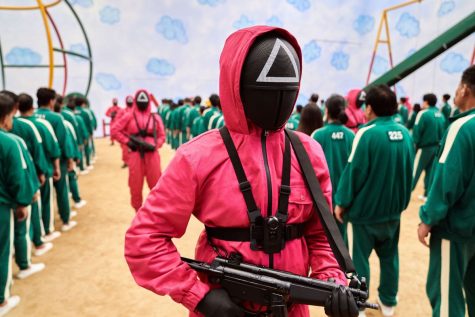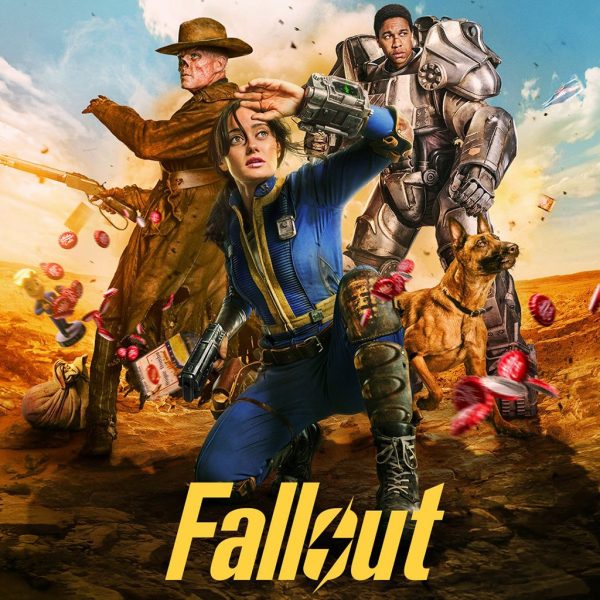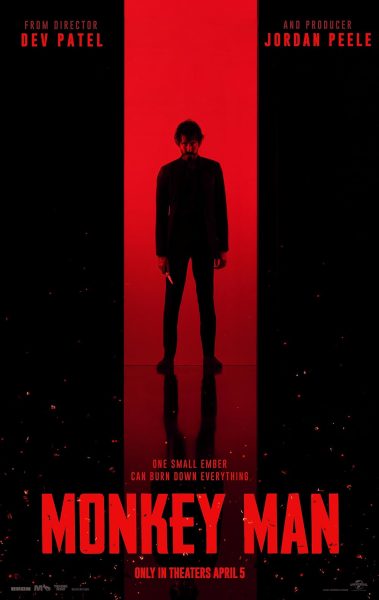Squid games turn playground games deadly

Armed game makers in red watch the game players in blue.
Before its popularity, the show Squid Game seemed like any other Korean drama show on Netflix. Twenty-three days later, the show gained 132 million views worldwide, 900 million dollars in the box office and became Netflix’s most-watched show.
Squid Game, directed by Hwang Dong-hyuk, features 456 contestants who compete in various children’s games to win 45,600,000,000 Korean won(equivalent to $38,460,271,20 USD). Playing basic children’s games might seem like an easy bargain, but there is a dark twist- the only way people were eliminated to declare a singular winner was through death.
When I watched the first episode, I hated the game makers and only sympathized with the game players – until I watched the second episode. The game players aren’t the only ones at risk of death during the games- so are the game makers. If the masked game makers don’t comply with the head’s orders or expose their identity, they will also die. However, they don’t have to compete in the killer games the game players do. An example was the very first game that put thrill into the first episode: Red Light Green Light. The majority of the population around the world grew up playing this game, even I did. However, the difference is that if we moved during “red light,” we wouldn’t get shot.
The concept of a group playing a deadly series of games such that the last one standing (literally) is the winner – a factor I think that boosted this show’s popularity other than the TikTok algorithm. Watching the series reminded me of The Hunger Games (where kids are randomly selected to fight till death) and Escape Room (where young adults get tricked into playing a deadly version of an escape room). The other concept of “the crazy things people would do for money” ( such as dying) instills an ever-thrilling vibe where you don’t want to take your eyes off of the screen. The concept of the crazy acts people would do for money reminds me of the things people do around the world for the same reason: from in-home break-ins to nasty murders – people do anything to fulfill their starvation for more money. It is safe to say that the relatability of the themes to us viewers and how the thrill makes you sit on the edge of your seat deemed Squid Game to become Netflix’s most-watched shows.
Not only do the thrill and relatability contribute to the show’s success, but so does the fantastic cinematography. From the overused realistic gore scenes to the sense of humor to lighten the mood, the thing that stuck out the most was the structure of explanations incorporated throughout the show. When I watched the first episode, I thought that this show would be another gory-action incorporated show and thought to myself, “How is this a Korean Drama? Shouldn’t it be in the thriller genre?” However, once they showed the characters’ backstories, I found the plot to be more understandable as to why they are doing so much for the amount of money. The sad backstories also made me appreciate the characters and understand them deeper, making me more sympathetic as I progressed throughout the story. One such example I connected to the most was that the protagonist, Seong Gi-hun, was trying to win the money to support his daughter, both financially and emotionally. Even though he didn’t end up emotionally supporting his daughter at the end (which made me mad), the intertwining of a thriller and drama into one show also contributed to the show’s popularity.
Squid Game’s unflinching brutality is not for the faint of heart, but sharp social commentary and a surprisingly tender core will keep viewers glued to the screen – even if it’s while watching between their fingers.
— Rotten Tomatoes Consensus
Ever since the show gained popularity, it opened more potential viewers for other similar Korean Dramas – which is no surprise to me because I have always known Korea to have one of the best entertainment industries. There have been times when I was scrolling on TikTok and saw captions such as, “If you enjoyed Squid Game, you would enjoy shows such as Extracurricular and Sweethome. Extracurricular features the lives of different students outside of school, which stresses the additional amount of economic parallels (just how Squid Game emphasized the drive for money) each student faces, with hints of violence and drug use. In contrast, Sweethome is an unrealistic yet exciting and gory apocalyptic survival show.
Squid Game did not just boost the Korean film Industry but also spread the love of Korean dramas worldwide. From breaking records to introducing and popularizing other Korean shows, it is safe to say that Squid Game is a massive hit on the international film industry. Even though some people might not be into gore, each person has different preferences, and the diverse Korean entertainment industry provides just that.
The South Korean TV sensation taps into the universal apprehensions of pressing debt, strained family relations and the longing for a better life.
— Eddie Cockrell
Your donation will support the student journalists of Carnegie Vanguard High School. Your contribution will allow us to cover our annual website hosting costs and fund field trips, competition fees, and equipment. We appreciate your support!











